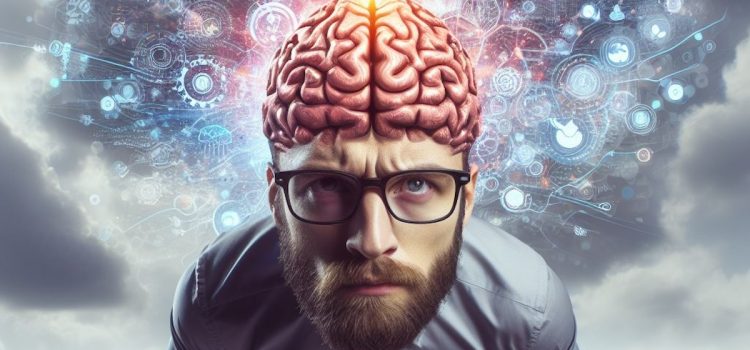

This article is an excerpt from the Shortform guide to "Huberman Lab". Shortform has the world's best summaries and analyses of books, podcasts, and more.
Like this article? Sign up for a free trial here.
What’s the science behind willpower? What goes on in your brain? Can you do anything to strengthen your determination?
On an episode of the podcast Huberman Lab, Andrew Huberman discussed the science of willpower. He talked about the role that the anterior mid-cingulate cortex plays in self-control and determination and highlighted recent debates in the field sparked by glucose-willpower theories.
Keep reading to learn more about these intriguing issues.
Unraveling the Science of Willpower
In the podcast episode, Huberman touched on the science of willpower, especially the anterior mid-cingulate cortex (aMCC) and glucose consumption. We’ll look at what Huberman covered and add some context, broader perspectives, and links to related reading on the matter.
The Role of the Anterior Mid-Cingulate Cortex
The aMCC is a key region in the brain that integrates internal and external information. Confronting obstacles significantly activates the aMCC, underscoring its central role in self-control and resilience.
Operating as a hub influenced by inputs related to various cognitive functions, the aMCC enhances our willpower when it’s needed most. Huberman spotlights how the aMCC modulates motivation and behavior critical for achievement and self-discipline. By shedding light on the aMCC’s function, the podcast episode provides insight into the neural underpinnings of perseverance in the face of challenge.
Scientific Controversy Over the Glucose Connection
The podcast episode covered how discussions on Roy Baumeister’s findings linking glucose consumption with cognitive stamina have sown controversy, particularly due to Carol Dweck’s dispute of willpower’s reliance on glucose.
Context
Grasping the scientific information covered in the summary requires understanding neural circuitry—interconnected neurons processing and transmitting information that shape thought and behavior. We’ll explore the anterior mid-cingulate cortex (aMCC), a region modulating determination, self-discipline, and resilience.
The aMCC, part of the medial frontal cortex, contributes to goal-directed cognition and actions. This vital neural circuitry governs motivation and conduct essential for willpower, determination, self-mastery, and resilience. That is, the capacity to persevere toward goals despite obstacles, manage impulses to align with long-term aims, and adapt when facing adversity while maintaining well-being.
Psychologists have long found willpower a captivating concept. Central here is psychologist Roy Baumeister’s 1990’s ego depletion theory—that self-control and decision-making drain limited willpower reserves. Also, his research links glucose to cognitive stamina, suggesting glucose sustains willpower.
But, disputes have emerged questioning ego depletion’s reliance on glucose as a determinant. For instance, Dr. Carol Dweck challenges the glucose-cognition link. These controversies spark alternative perspectives on willpower’s complexity.
Two key debate themes emerge: (1) challenging that willpower is finite, and (2) examining self-control energy beyond glucose. Researchers suggest motivation’s interplay with willpower could provide insights, as could probing neural self-control mechanisms.
Clearly, researchers seek to unravel intricacies surrounding willpower for insights into behavior. As alternative models related to this multifaceted phenomenon emerge, we can expect this captivating debate to persist, enhanced by empirical inquiry from diverse vantages.
More Perspectives
While the podcast summary provided thoughtful perspectives on the aMCC’s role in willpower and self-discipline, certain aspects warrant deeper examination. It proposes the aMCC singly governs determination, but other regions likely contribute as well. Also, the claim that confronting obstacles heightens aMCC activation simplifies the intricate neurobiology involved. Factors such as motivation and support doubtless shape this complex capacity, too.
The episode summary highlighted the aMCC’s integration of inputs from diverse cognitive functions, but it lacks specifics to elucidate this process and how it bolsters willpower when we need it most. Attributing achievements and self-control solely to the aMCC discounts other contributing cognitive, emotional, and behavioral factors. Finally, examples would help illustrate the asserted nuanced modulation of motivation, action, and inaction by the aMCC.
While critiquing particular constraints, this analysis doesn’t dismiss the value of investigating the aMCC’s functions through multifaceted research. As studies probe how neural circuitry and additional variables affect willpower and resilience, richer insights will surely emerge. A thoughtful, evidence-based approach can uncover new revelations about this intricate phenomenon.
Indeed, willpower’s complexity stirs ongoing scientific debates over ego depletion and glucose’s role. While acknowledging intricacy, claims about diverse energy forms enabling self-control require clarification. Without properly defining or quantifying these proposed energy types, substantiating evidence remains insufficient. Also, contesting glucose’s influence without offering alternative explanations or data weakens that stance. We must consider consistent empirical support for links between glucose and cognitive stamina, indicating a potential role.
But, we need not wholly reject this connection due to conflicting interpretations. Controversies should be examined through the lens of research affirming this relationship. Dismissing it solely over disputes disregards considerable supportive evidence.
Clearly, an open-minded, thoughtful approach best serves these complex debates. Rather than oversimplified concepts of finite resources or sole glucose dependence, multiple perspectives deserve fair contemplation to get a more sophisticated understanding of the captivating phenomenon of willpower. With rigorous yet adaptable investigation, illuminating discoveries surely await.
Related Reading
The Tenacious Brain: How the Anterior Mid-Cingulate Contributes to Achieving Goals
Since 1907, when the anterior division of the mid-cingulate cortex was first described, our understanding of the aMCC organization has significantly advanced.
Architectures of neuronal circuits | Science
Unlike computer circuits, which are products of top-down design, neuronal circuits are products of hundreds of millions of years of evolution. Some circuit motifs may have originated long ago, having since been conserved across diverse clades and passed on to more recently evolved neural regions.
While most theories have treated motivation as a one-dimensional construct that varies only in amount (Deci and Ryan, 2008), self-determination theory (SDT) has regarded motivation as a multidimensional concept that can vary not only in amount but also in type.
Have We Been Thinking About Willpower the Wrong Way for 30 Years?
November 23, 2016. Not so long ago, my post-work routine looked like this: After a particularly grueling day, I’d sit on the couch and veg for hours, doing my version of “Netflix and chill.”
What you need to know about willpower: The psychological science
Willpower researcher Roy Baumeister, PhD, a psychologist at Florida State University, describes three necessary components for achieving objectives: First, he says, you need to establish the motivation for change and set a clear goal. Second, you need to monitor your behavior toward that goal. The third component is willpower.
Does willpower depend on the amount of glucose in the body?
It’s all too rare to see critique get voiced clearly in psychology. There is a follow-up too. His peeve seems to be mostly the resource model, not the idea that glucose has some causative influence.
The Willpower Instinct by Kelly McGonigal
Most people think of willpower as a virtue, an admirable trait that we strive for but don’t always achieve. But science tells a different story. Willpower—the ability to exercise self-control when you need it—is an instinct that’s wired into our brains. Yet it seems like willpower vanishes at crucial moments, like when your coworker shows up with a box of donuts.
To harness your innate willpower, you need to understand what factors make you give up your self-control. In The Willpower Instinct, Stanford psychology professor Kelly McGonigal details how our natural willpower gets compromised by stress, distraction, lack of sleep and exercise, and a host of other factors. Using the latest psychology and neuroscience research, she offers strategies to help us defeat procrastination, control cravings, and achieve our goals.

———End of Preview———
Like what you just read? Read the rest of the world's best guides to Huberman Lab" at Shortform.
Here's what you'll find in our full Huberman Lab episode summaries:
- How science can be applied to improve your daily life
- Information about key scientific tools and how they impact society
- How technology, biology, and health are connected






